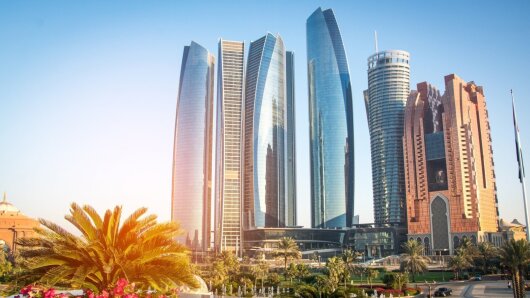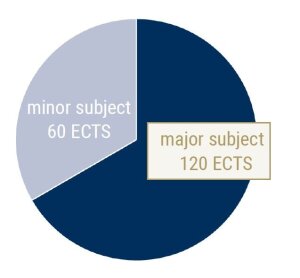
- Degree
- Bachelor of Arts
- Supplement to degree
- major in a multi-subject bachelor’s programme
- Admission restriction
- without admission restriction (without NC)
- Duration
- 6 Semesters
- Credits/ECTS
- 120
- Teaching language
- German
- Tuition fee
- None
- Semester contribution
- € 305,05
- Start of studies
- Winter semester
- Part-time possible
- Yes
- Institutions
- Faculty of Arts
- Department of Oriental Studies
Programme content
Discover the diversity of the Arab world!
The basis of the degree programme is intensive language training. This opens the door to media, literature and »country and people«. Together with the language, you will learn the basics of Arabic culture, which are indispensable for communicating successfully in an Arabic environment. To this end, we work together with the (subject) area|field of Intercultural Business Communication, among others. This gives you direct access to the Arab world and Islam and enables you to familiarise yourself with the complex interrelationships at first hand.
Our Arabic lessons are communicative and at the same time linguistically sound. You will learn modern and classical standard Arabic as well as an Arabic dialect (e.g. Syriac Arabic), which will enable you to communicate naturally in everyday situations. The extended range of languages offered by our institute also includes a number of other languages, such as Modern Hebrew, Persian, Akkadian, Biblical Hebrew and Ancient Ethiopian.
Islam in theory and practice
Islam , with its religious practice, its social image and its history, is a decisive factor in life in the Arab world. Introductions to contemporary Islam with its various currents and to the History of the Islamic world are therefore part of the basic training. Seminars on individual topics deepen this knowledge. Our range of topics includes both contemporary topics (e.g. Islamism; modern political theories) and historical topics (e.g. Christians, Jews and Muslims in the Arab Middle Ages; the emergence of the Qur'an). As a result, you will learn to assess developments beyond clichés and polemics.
The world of classical Arabic
The literature of the classical period (ca. 750-1300 AD) is still a living part of the cultural heritage of the Arab world today. Whether prose or poetry, philosophical treatise, mystical wine poem or entertaining collection of fables, the texts of this period set new standards and represent the beginning of a long and diverse literary tradition. By reading and analysing texts from classical Arabic literature, you will gain an insight into the social, cultural and intellectual developments of early Islamic-Arabic societies, whose influence reached as far as Europe.
Arabic Studies in Jena - up-to-date and true to life
Arabic Studies only deals with the past of the Arab world? Far from it! In various exciting seminars, for example on Arabic politeness or Arabic life in Germany, you can learn about different aspects of contemporary Arab culture. We take a differentiated, reflective and critical look at current topics and provide you with the necessary background knowledge to be able to categorise them.
Ifyou are interested in the Arab world and at the same time aspire to a career in the subject) area|field, the B.A Business and Languages with specialisation in Arabic may be the right choice for you, as it combines modules in Economics and BusinessAdministration-Focus: Business Analytics.
Structure
Multi-subject bachelor’s programme
Picture: Sophie BartholomeThe Bachelor's degree is the first professional qualification. The standard period of study|regular programme length is six semesters in total, during which various types of courses (e.g. seminars, lectures or tutorials) are offered for the individual modules.
Arabic Studies is tendered as a multi-subject Bachelor's degree programme. This consists of a major subject with 120 credit points (ECTS)|ECTS credits and a supplementary subject with 60 ECTS credits.
If you choose Arabic Studies as your major subject, you will earn 120 credit points in Arabic Studies and 60 credit points in a supplementary subject of your choice.
If you choose Arabic Studies as a supplementary subject, you will earn 60 ECTS credits in Arabic Studies and 120 ECTS credits in a major subject of your choice.
Popular subjects with which Arabic Studies can be combined include Political Science, German as a second and foreign language de, Religious Studies, History de and German Literature de.
How might your degree programme shape up?
| 1st semester | 2nd semester | 3rd semester | 4th semester | 5th semester | 6th semester |
| Arabic I (10 CP) | Arabic II (10 CP) | Arabic III (10 CP) | Arabic IV (10 CP) | Required elective module: Literature / Culture / Regional Studies of Arab-Islamic Societies I (5 CP) | Required elective module: Basic module History of the 19th and 20th centuries (5 CP) |
| Introduction to Islam (5 CP) | Fundamentals of Arabic Studies (5 CP) | Arabic Dialect I (5 CP) | Arabic Dialect II (5 CP) | Required elective module: Classical Arabic I (Grammar) (5 CP) | Required elective module: Classical Arabic II (Literature) (5 CP) |
| Required elective module: Religion / History / Politics of Arabic-Islamic Societies I (5 CP) | General key qualifications (10 CP) | Required elective module: Religion / History / Politics of Arabo-Islamic Societies II (5 CP) | Practical module (10 CP) |
Bachelor's dissertation (10 CP)
|
Abbreviations: LP = credit points (ECTS)|ECTS credits
Students must choose 6 required elective modules totalling 30 CP. Of these, at least 5 modules totalling 25 CP must come from the Arabic Studies tender. A maximum of one required elective module (5 CP) can be chosen from the import area according to the module catalogue.
More detailed information can be found in the module catalogue for the degree programme.External link
Why study in Jena?
Many academics deal with the Middle East, but hardly anyone speaks the relevant languages or has been there for any length of time. Studying in Jena enables fundamental language training and networking in local societies. By combining Political Science and Arabic Studies, I not only learnt linguistic and intercultural skills during my Bachelor's degree, but also gained a completely different perspective on the region through stays abroad.
Emma Nentwig (B.A. Arabic Studies major subject, 6th semester)
- Interdisciplinary: In addition to the study of Arabic, we offer an interdisciplinary education that provides insights into linguistics, literature, religion and history. Students of Arabic Studies benefit from the seminar's numerous collaborations with other departments, such as the Faculty of Economics and Business Administration-Focus de: Business Analytics and the Centre for Culture- and Religion-Sensitive Education de.
- Practice-orientated: In addition to classical Arabic and modern standard Arabic, students have the opportunity to learn the Syrian dialect, which enables them to communicate in Arabic in everyday life. In cooperation with the Intercultural Business Communication subject) area|field, we offer courses in Intercultural Communication. As part of the B.A. Arabic Studies programme, students complete an internship that gives them an insight into the various professional applications of their studies. Our contacts in the Arab world also provide our students with attractive local internship opportunities.
- International: The easiest way to learn Arabic is to stay abroad. That is why we support students in planning and organising a stay in the region through our various local contacts. Students can get help with questions about funding from the University's International Office de.
- Diverse: In addition to Standard Arabic and an Arabic dialect, Arabic Studies students can learn up to 7 other languages during their studies. The Arabic Studies and Islamic Studies seminar offers students of all disciplines a unique selection of languages, including Turkish, Persian, Syriac-Aramaic, Old South Arabic and Old Ethiopian.
- Close to research: The Seminar for Arabic Studies and Islamic Studies is home to two important collections: The Oriental Coin Cabinet de and the Alphons Stübel Collection of de Early Oriental Photographs. We are involved in various research projects de on the languages and cultures of ancient South Arabia and Ethiopia.
- Boundless possibilities: Experience internationality! The university attracts students and academics from all over the world with its attractive conditions and characterises Jena as a future-oriented and cosmopolitan city - these are ideal requirements for prospective international studentsmp4, 57 mb · de.
What can you do after your studies?
Possible professional fields:
With a degree in Arabic Studies, you will not only acquire extensive linguistic and specialised knowledge, but also learn methods and approaches that will qualify you for a wide range of fields of work. You will also develop an attitude of openness and foresight, which will be in demand wherever mediation between people of different cultures and religions is required. Our graduates work
- as experts for the Arab-Islamic world in public facilities|institution|(structural) units, ministries and international organisations
- in intercultural communication in business and politics
- in security, migration and integration policy
- in research institutions, e.g. libraries
- in scientific research projects
- in foreign language teaching, e.g. German as a Foreign and Second Language
- as interpreters
On the research-oriented master's degree programme in Arabic Studies de, you can deepen your academic profile according to your own specialisation and also pursue an academic career up to doctorate level.
Downloads and links for the degree programme
What are we looking for in prospective students?
- Enjoy learning foreign languages and working with texts
- Interest in historical, cultural and political contexts
- Previous knowledge of Arabic is not required
- A sense of adventure for the stay abroad
Admission requirements
-
University entrance qualification
A university entrance qualification, such as a general secondary school leaving certificate, is required for admission onto the study programme.
More information on university entrance qualifications can be found here.
-
Language requirements
Two foreign languages. English and French reading skills are particularly advantageous. Proof by the time of registration for the Bachelor's thesis at the latest.
Previous knowledge of Arabic is not required.
Contacts
Zwätzengasse 4
07743 Jena
Google Maps site planExternal link
Opening hours:
nach Vereinbarung
Bachstraße 18k
07743 Jena
Telephone hours:
Mondays and Fridays (9:00 – 11:00)
Wednesdays (13:00 – 15:00)
The ASPA is primarily responsible for students in the Faculty of Social and Behavioural Sciences, the Faculty of Arts and Humanities, and the Faculty of Theology.
Postal address:
Akademisches Studien- und Prüfungsamt
Fürstengraben 1
07743 Jena
University Main Building / SSZ
Fürstengraben 1
07743 Jena
Google Maps site planExternal link
Office hours:
We offer consultations in person, by telephone, and via Zoom. You can make an appointment by calling us on +49 3641 9-411111 (Mondays to Fridays from 9:00 to 11:00) or outside these office hours on +49 3641 9-411200. You can also use our remote help desk.
Consultation hours:
Mondays, Tuesdays, Thursdays and Fridays (9:00 to 12:20), Tuesdays (14:00 to 18:00), and Wednesdays and Thursdays (14:00 to 16:00).
Video chat: To the video chat – Zoom Videochat ZeitenMondays to Fridays (12:30 to 13:00) Password ZSB2020 Data protection informationpdf, 101 kb
University Main Building, Room E065
Fürstengraben 1
07743 Jena
Google Maps site planExternal link
Opening hours:
Information Desk (UHG; Room E0.65)
Mondays (10:00 – 12:00)
Tuesdays (13:00 – 15:00)
Wednesdays (10:00 – 12:00)
Thursdays (13:00 – 15:00)
Fridays (10:00 – 12:00)
You can also use our remote help desk at
www.uni-jena.de/service-ssz
or send us your enquiries by post.
Telephone hours:
Mondays to Fridays
(9:00 – 11:00)
Postal address:
Friedrich-Schiller-Universität Jena
Studierenden-Service-Zentrum
07737 Jena
University Main Building
Fürstengraben 1
07743 Jena
Google Maps site planExternal link


